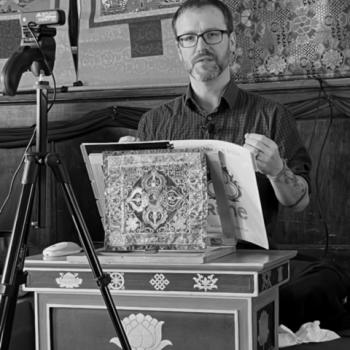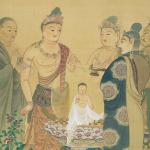
Ikkyu said,
“Like a vanishing dew, a passing apparition or sudden flash of lightning – already gone- thus should one regard one’s self.”
He was echoing the Diamond Sutra, which is a foundational Zen text. In the Diamond Sutra the Buddha says,
“All composed things are like a dream, a phantom, a drop of dew, a flash of lightning. That is how to meditate on them, this is how to observe them.”
Ikkyu was taking that concept from the Diamond Sutra, that all things are like a flash of lightning, and reminding us that this applies to the self as well as all other things. It’s important to remember that we are impermanent and conditioned, just as much as everything else is.
I think we have an easy time learning, on the path, that all things are compounded and impermanent. But sometimes we make the mistake of not extending that all the way.
It’s easy to see that my car is a collection of parts. It has an engine and a battery and tires and a gas tank and many many other parts that combine to make a car. And over time parts will be replaced.
It’s easy to see that my car is a compounded thing, that it’s a collection of parts rather than being one thing. A lot of things had to come together to create my car. It’s also easy to see that my car is impermanent. Everyone knows that over time more and more parts wear out and sooner or later the car just isn’t worth fixing anymore. Eventually repairing the car becomes more expensive and difficult than buying a new car. This is because the car is impermanent.
Everything is compounded and impermanent.
And if we just pay attention, we can see this.
But what about us. What about you and I? That’s where we struggle.
We are compounded and impermanent too. Many different things came together to create YOU. Not only your parents, but also the environment you grew up in shaped both your personality and, in ways we may not fully understand, your physical body as well.
Even if we just focus on your mind, a lot goes in to who you are. You have your natural intelligence, your knowledge, your experiences that color the way you see things, your attention to detail, your emotional well-being, and many many other factors. All of these things come together to make you.
And everything about you changes over time.
There are probably plenty of things we hope will change about ourselves. And some things that we hope won’t. But the point is that all things are changing.
If we are just a collection of things, like parts of a car, then our self is less significant than we think it is.
So, what are the implications of this?
Well, feelings of greed and jealousy become insignificant if we aren’t so focused on ourselves. We have this tendency to think in terms of “I, Me, Mine” most of the time and that often doesn’t serve us well. I think everyone agrees that the world would be a better place with less selfishness. Recognizing ourselves as part of a context rather than thinking we are some separate independent being can go a long way toward fixing many of the problems in the world.
Because of selfishness we are greedy. Because of selfishness we are jealous of others and we tend to get upset if we don’t have everything that we think we deserve. Because of selfishness we take others for granted, which can greatly damage our relationships. Selfishness is at the root of many of our human problems.
A lot of our anger is motivated by selfishness as well. When we get mad or upset that things aren’t the way we want them to be, or that others aren’t behaving in the way we think they should.
It can make us want to help them instead—and ultimately, helping others is really important in Buddhism.
When we recognize that we are everything, it can be easy to forgive everything—or at least accept everything.













